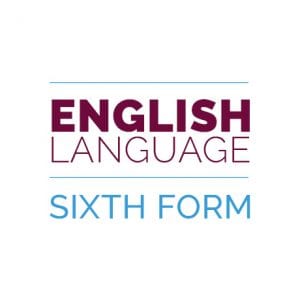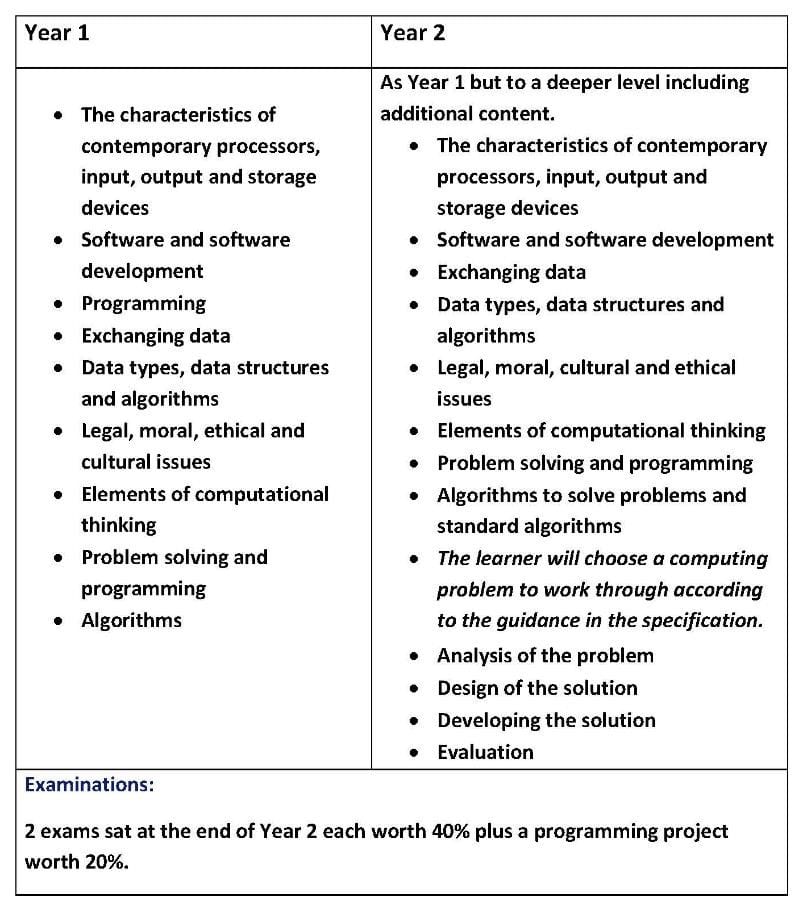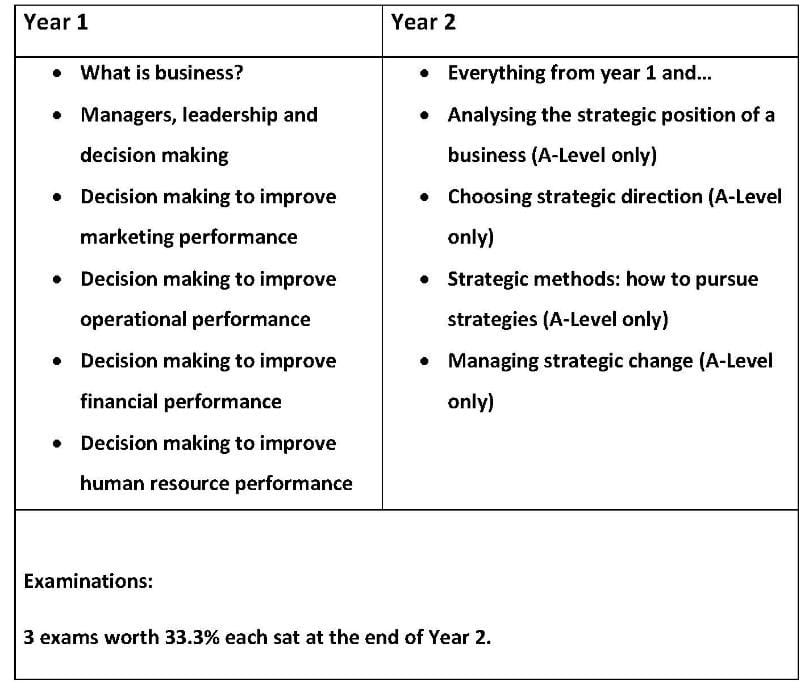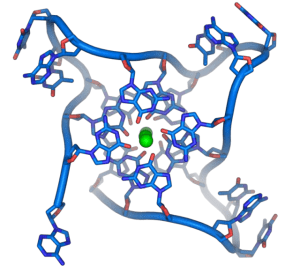What will I study?
Historian Arthur Marwick commented – ‘History is to society as memory is to the individual’ and we feel at Sutton Community Academy that this explains the importance of history today. We encourage students to study a wide range of historical time periods in order for them to really get a sense of the importance of history and how it has impacts in every part of the world. In Year 12, students look at Germany 1919-1963 and the Early Tudors 106–60. Whilst in Year 13, we focus on an in-depth study of Russia 1855-1964 and on coursework based module on America between World War One and World War Two.
What can it combine with?
History is a diverse subject where you are taught to analyse and dissect information in order to present a hypothesis; therefore it combines well with most subjects. Our current students also study Maths and the Sciences as it gives them the opportunity to maintain an English based subject as well as other students who focus more on the English Literature and Law aspect in order to complement each of the subjects with the focus of writing skills and developed analysis
Where can it lead?
Some of the most important people in the country today are History graduates. Previous Prime Minister for the Labour Party, Gordon Brown studied History as did the founder of the Body Shop, Dame Anita Roddick. Therefore History can lead you into all types of professions from Public to Business, from Journalism to being a Pop Star (Shakira). History allows all students to challenge perceptions, propose and formulise a theory and to be able to back up that theory through knowledge which is essential for all professions.
You might be interested to know…
History is a very highly respected subject at Sutton Community Academy where students consistently achieve well. We also have a number of students who continue to study History at University including the Universities of Oxford and Chester.
We also organise a number of trips including Berlin, Germany in Year 13 and the opportunity for two students to visit Auschwitz-Birkenau in Poland. Students are also given the opportunity to attend lectures by examiners in both Year 12 and 13 to help broaden their knowledge of the subject and develop their study skills.
Entry requirements
Students need to achieve at least a 4 in History and four other subjects.
What will I study?
In Year 12 you will study coasts, hazards and the geography of places. You will also learn about cartographic, statistical and ICT skills used in geography, as well as taking part in fieldwork days.
In Year 13 you will study water and carbon cycles, global systems and global governance and population and the environment. You will complete an individual project of between 3000-4000 words which is worth 20% of your A-Level. There will also be at least two days of fieldwork taking place.
What does it combine with?
Geography overlaps with many subjects. The ‘human’ side of the subject links well with English, media, business and travel & tourism, whilst the ‘physical’ side complements Maths, Physics, Biology and Chemistry.
Where can it lead to?
Environmental Geography is now a huge subject at university and degrees in topics such as global warming can now be studied. Engineering, surveying, ecology and the travel industry are all areas suited for geography.
You might be interested to know…
There is a compulsory field trip in Year 12, and this will form a major part of the overall course. There are many famous people who have studied geography at university and these include Prince William, Chris Tarrant and Nick Hodgson (Kaiser Chiefs)
Entry requirements
There is no need to have studied this at GCSE level, but a grade 9 – 4 in Maths and English would be an advantage.
What will I study?
The A-Level course is designed to enhance your understanding of French and to advance your ability to understand and use the French language. Not only will you develop your linguistic abilities but you will also learn to explore a wide range of cultural topics. Throughout the course you will learn about current trends in French society, such as the changing nature of family life and the rise of the “cyber-society”.
What does it combine with?
A foreign language combines well with many subject areas such as English, Business, Travel and Tourism, Law and complements other subjects such as Science and Maths.
Where can it lead to?
Not only is an A-Level in a foreign language beneficial at a personal level, but it can also help with many career paths. For those who want to specialise in French, there’s translation or teaching. Or you may want to work in the travel or tourism industry. In addition, if you want to become an engineer or a designer, for example, or work in business, being proficient in a language will give you broader career options, or give you the option of working abroad.
You might be interested to know…
French A-Level is highly regarded by universities and it can be combined with many different subjects at degree level. You spend a year abroad as part of a languages degree course.
French can also be studied as part of a combination degree such as French and business or French with European Studies. The exam is through AQA.
Entry requirements
GCSE level 9 – 6
What will I study?
Studying A-Level English literature at Sutton Community Academy will encourage you to develop your interest and enjoyment of the written word. By reading widely, and critically, across centuries, gender and genre, you will develop as an independent reader and critic. You will be taught to critically analyse a text according to its historical and cultural period and, as well as enjoying great works, you’ll develop keen powers of analysis and an understanding of literature in all its forms. You will also study a range of texts including Shakespeare’s Othello and Arthur Miller’s Death of a salesman to explore how tragedy has changed across the ages. In Year 13, you will study novels, plays and poems which have been seen as making social and political statements. These will include The Handmaid’s Tale and The Kite Runner.
Where can it lead to?
Many students decide to continue their study of English Literature at university. This A-Level can also be used to gain access to a Degree in history, creative writing, politics, media and communications or journalism.
The skills taught on this course will equip you with the knowledge necessary for a working life in teaching, publishing, the media, social work, law and the public sector (defence, education or social security).
You might be interested to know…
Year after year the pass rate for this course is continuously high. The teachers have a passion and enthusiasm for the subject which they keen to share!
The coursework element allows you to select which texts you are going to analyse.
Entry requirements
It is expected that you will have a grade 5 or above in GCSE English literature.
What will I study?
As the dominant language in the modern world, communication through English governs the media, advertising, law and business.
In working towards an English Language A-Level you’ll learn about both the past, the present and the possibilities for the future of the language. You’ll be encouraged to explore how it is used to communicate through spoken and written texts, ranging from chat shows and radio broadcasts to horoscopes and a wide range of genres in fiction. The different variations of the English language will be analysed, developing your understanding and appreciation of English in all its contexts. You’ll look at accents and dialects, how language conveys prejudice, how we manipulate our audiences and how men and women may use language differently. Key topics will include, original writing, spoken language study and language and society. You can expect to develop your skills as a writer, take part in language research and analyse spoken and written texts as part of your A Level study. You will look at the way we speak and the language we use. You will also study how language has changed as well as the history or the English language. Further areas of study include, how we acquire language and how our language develops through childhood into adulthood
What does it combine with?
A -Levels such as Media, English Literature, Business Studies, Law, History, French and Psychology, would all complement an English language A-Level.
Where can it lead to?
An English language A-Level is highly regarded by universities, providing a solid grounding for continued study at degree level. Degree programmes in English language or literature, creative writing, history, politics, journalism and media and communications, are all possible routes into higher education. Your career options include work in publishing, advertising, law, media and teaching (with further study or teaching abroad).
You might be interested to know…
It is the perfect combination of creativity and analysis as you have to produce your own fiction and non-fiction writing for coursework and also closely evaluate a range of texts – so English language suits every type of mind!
Each year we have high pass rates for students on the English AS and A Level courses.
The teaching staff for this course have many years of experience working in education teaching English.
Entry requirements
It is expected that you will have a grade 5 or above in GCSE English literature.
What will I study?
What does it combine with?
If you are interested in computer science at university then the following A-Level qualifications are also recommended… Computer science, maths, further maths, physics and philosophy.
Where can it lead to?
This is an ideal course to complement further study in computing or a related area through a range of higher education/vocational courses (e.g. computer science, computing and software engineering) or direct entry into employment. It will also provide a basis for students wishing to follow a career in computing gaming, website design and in other IT related careers.
Entry requirements
There are no previous learning requirements, however a good grade in GCSE mathematics and computer science experience is strongly recommended. Any requirements for entry to this course are at the discretion of Sutton Community Academy.
What will I study?
Chemistry has a huge impact on our lives. This course links chemical theory to real life applications. From the development of new medicines and consumer goods to how we control levels of pollution, the study of Chemistry plays an exciting and important role in the modern age and the future.
An A-Level in Chemistry will help you build and develop your knowledge of chemical processes through a good mixture of both practical and theory based work. Core areas will include physical and organic chemistry, thermodynamics, atomic structure and experimental investigations.
We currently deliver the OCR A-Level course that covers the three areas of chemistry; physical chemistry, organic chemistry and inorganic chemistry over two years. The programme of study builds upon the studies from Year 10 and 11.
What does it combine with?
A-Level Chemistry will complement Biology, Physics, Maths and Forensics.
Where can it lead to?
The chemistry A-Level can lead on to degree courses and further study of chemistry, biochemistry, chemical engineering, medicine, dentistry, veterinary science, pharmacy, pharmacology, food science, nursing and physiotherapy. A-Level chemistry is highly recommended for biology, forensic science, geology and various environmental science courses.
You might be interested to know…
An A-Level in Chemistry is well regarded in general by universities when selecting candidates for more challenging degree courses.
Entry requirements
Science GCSE grade 6 or above
What will I study?
What does it combine with?
There are a number of A-Levels that would complement business studies. A-Level Mathematics, English language, Law and History are all relevant in terms of content or skills used to succeed in these subjects.
Where can it lead to?
Many students have continued their studies at university level on a wide range of courses. Degree options ranging from economics, finance and accounting to management, enterprise and e-business, are all possible routes into higher education. A-Level Business Studies students will be equipped to enter the real world of business in almost any occupation in the private sector. This course will give you an early taste of many possible careers (including accountancy, marketing and personnel management) as well as being a valuable precursor to university level courses in business-related fields.
Entry requirements
There are no previous learning requirements. Any requirements for entry to this course are at the discretion of Sutton Community Academy.
What will I study?
Understanding Biology is the key to understanding the development of life. Finding cures for diseases, tackling environmental issues and solving crimes through forensics are just some of the important roles a Biologist can play in society.
Topical issues such as disease, genetic engineering, DNA structure and the environment are all covered in A-Level Biology. You can expect to develop a wealth of knowledge on cells, organs, the treatment of diseases and human evolution, to give just a small sample of the areas covered.
What does it combine with?
This A-Level would combine well with Chemistry, Psychology or Geography.
Where can it lead to?
The A-Level in Biology is a highly regarded qualification that can lead to further study for a degree in medicine, nursing, veterinary science and animal care at university. Careers in medical professions such as dentistry or physiotherapy are accessible, as is work in the environmental and pharmaceutical research fields.
You might be interested to know…
The teaching staff on this course come with many years of experience in teaching.
Entry requirements
Science GCSE grade 6 above
What will I study?
Art, in all of its forms, inspires creativity, stirs emotion, sparks debate and reflects society.
On the OCR Art and Design A-Level, you can express your own creative flair within your specialisation through a broad based art, craft and design specification be it drawing, painting, sculpture, photography, graphic design, textiles, illustration or printmaking. The programme will cover a wide variety of media, allowing you the opportunity to flex your creative muscles while learning new techniques and approaches. Producing creative, dynamic and exciting outcomes, they can inspire and challenge.
How the course is assessed:
Controlled assessment & 3000 personal study 60%
Externally set exam project resulting in a 15 hour final piece 40%
What does it combine with?
The Art and Design A-Level would complement courses in English Literature, Film Studies, Media Studies and technology.
Where can it lead to?
Careers as an animator, illustrator, product designer or fashion designer are all possible pathways for Art and Design students.
Work in the media, film and television, marketing and the textile industry are further options. You can pursue art and design at university with a degree in fine art, visual culture, art history or illustration.
You might be interested to know…
Trips to art galleries are planned, along with life drawing lessons. We have a specialist bespoke A-Level suite.
Entry requirements
Art GCSE grade 6 above












